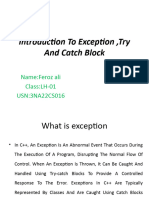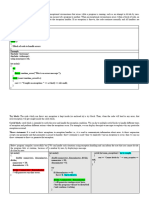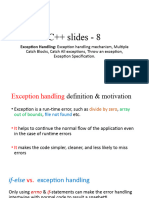0% found this document useful (0 votes)
4 views15 pages6a. Exception Handling CPP
Uploaded by
tanishqkavlekar20Copyright
© © All Rights Reserved
We take content rights seriously. If you suspect this is your content, claim it here.
Available Formats
Download as PDF, TXT or read online on Scribd
0% found this document useful (0 votes)
4 views15 pages6a. Exception Handling CPP
Uploaded by
tanishqkavlekar20Copyright
© © All Rights Reserved
We take content rights seriously. If you suspect this is your content, claim it here.
Available Formats
Download as PDF, TXT or read online on Scribd
/ 15






















































